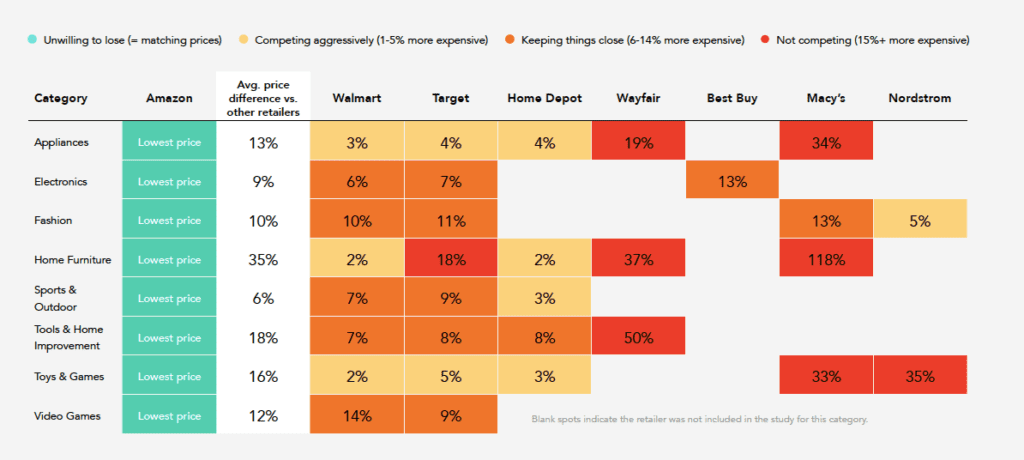Amazon.com Inc. (No. 1 in the 2020 Digital Commerce 360 Top 1000) is many shoppers’ go-to online shopping destination, and it is the online price leader, beating out other big retailers on price by 15% on average, according to a new study by Profitero called “Pandemic Price Wars.”
In addition, the report found that Amazon was the most competitively priced retailer in 18 out of 21 consumer product categories featured in the study. Amazon tied with Walmart.com for the lowest online prices for cosmetics and with Chewy.com for pet products. But Target.com charges 20% more for the same food and beverage products that Amazon carries.
The study compared prices on 18,400 best-selling items in 21 categories across 14 online retailers, including Amazon, Walmart Inc. (No. 3), Target Corp. (No. 12), Chewy (owned by PetSmart Inc., No. 19), Wayfair Inc. (No. 6) and Best Buy Co. Inc. (No. 10). Only identical items available and in-stock in the same pack configuration were compared. Data was collected daily from Aug. 24-Oct. 18, 2020, with daily prices averaged over the full period for comparison. Prices for the same items were collected within 24 hours of each other to ensure the validity of the comparisons.
The retailers analyzed are going to become even more competitive around the holidays, Profitero says. Yet, Amazon had the lowest prices for many product categories that are often popular during the holiday season, including toys and games, appliances, furniture, electronics and more, according to the study.
“Today’s economic landscape is definitely having an impact on how consumers will approach buying gifts this holiday season,” says Erik Morton, senior vice president, product and strategy, at multi-channel ecommerce integration company CommerceHub.
Walmart is competing aggressively (just 2-3% more expensive) with Amazon in the appliances, furniture and toys and games category; Target is competing aggressively (4-5% more expensive) in appliances and toys and games; and Home Depot is competing aggressively (2-4% more expensive) in appliances, furniture, sports and outdoor, and toys and games, according to the study.
However, ome retailers prefer to not worry about Amazon’s lower prices. For example:
- Wayfair is not competing with Amazon in appliances (19% more expensive), furniture (37% more expensive) and home improvement products (50% more expensive).
- Target is not competing with Amazon in furniture (18% more expensive).
- Macy’s Inc. is not competing with Amazon in appliances (34% more expensive), toys and games (33% more expensive) and furniture (118% more expensive).

This chart from Profitero’s study shows how Amazon has the lowest price for holiday gift items, broken down by category, compared with other online retailers.
“Online retail is growing more category competitive due to the pandemic—especially in grocery. But Target does not seem worried about price competition with Amazon, or Walmart. Instead, it is commanding premiums and relying on a loyal following of shoppers and premium brand perception,” the report says.
Not all retailers strive to have the lowest price, however. Specialty retailers like CVS Caremark Corp. (No. 116), Macy’s Inc. (No. 14), Best Buy, Walgreens Boots Alliance Inc. (No. 30) and Wayfair “appear to deliberately choose not to compete with Amazon on price to preserve their margins. Instead, these retailers use differentiators—such as service, selection, convenience—to command price premiums on items Amazon is selling online for less,” the report says.
For example:
- CVS is 64% more expensive than Amazon.com on identical vitamins and supplements.
- Walgreens is 31% more expensive than Amazon for identical health and personal care products.
- Wayfair is 37% more expensive than Amazon for identical furniture.
- Macy’s is 41% more expensive than Amazon for identical beauty products.
- Best Buy is 13% more expensive than Amazon for identical electronics.
“With the COVID-19 spikes that are happening across the country, shopping for the holidays is undoubtedly going to take place online,” Morton says.
Digital Commerce 360 projects online holiday sales to surge by 43% in 2020. Thus, consumers will definitely be going online more to shop.
In fact, 70% of shoppers will not be going to shop in stores for Black Friday, according to a new study of more than 2,500 U.S. consumers conducted Oct. 22-23 by CommerceHub. This might be because 71% of consumers think there are going to be better deals online for Black Friday and Cyber Monday.
Regardless of the deals, 83% of those surveyed said they will be doing more than half of their holiday shopping online this year, up from 59% of consumers who said the same in last year’s survey.
Competitive prices will mean little if retailers don’t have the products shoppers want in stock. And this is already proving to be an issue: 35% of shoppers said they’ve already encountered out-of-stock products while shopping online for the holidays, according to the survey. Thus, 70% said product availability and product assortment are the most important factors when deciding where to shop for gifts.
Favorite